第115章 CHAPTER XLVI(2)
This was my first introduction to him. He took no notice of his brother, but received me as Napoleon received the emperors and kings at Erfurt - in other words, as he would have received his slippers from his valet, or as he did receive the telegrams which were handed to him at the rate of about one a minute.
The King of Kings was in difficulties with a little slip of black sticking-plaster. The thought of Gumpelino's Hyacinthos, ALIAS Hirsch, flashed upon me. Behold! the mighty Baron Nathan come to life again; but instead of Hyacinthos paring his mightiness's HUHNERAUGEN, he himself, in paring his own nails, had contrived to cut his finger.
'Come to buy Spanish?' he asked, with eyes intent upon the sticking-plaster.
'Oh no,' said I, 'I've no money to gamble with.'
'Hasn't Lord Leicester bought Spanish?' - never looking off the sticking-plaster, nor taking the smallest notice of the telegrams.
'Not that I know of. Are they good things?'
'I don't know; some people think so.'
Here a message was handed in, and something was whispered in his ear.
'Very well, put it down.'
'From Paris,' said Sir Anthony, guessing perhaps at its contents.
But not until the plaster was comfortably adjusted did Plutus read the message. He smiled and pushed it over to me. It was the terms of peace, and the German bill of costs.
'200,000,000 pounds!' I exclaimed. 'That's a heavy reckoning. Will France ever be able to pay it?'
'Pay it? Yes. If it had been twice as much!' And Plutus returned to his sticking-plaster. That was of real importance.
Last autumn - 1904, the literary world was not a little gratified by an announcement in the 'Times' that the British Museum had obtained possession of the original manuscript of Keats's 'Hyperion.' Let me tell the story of its discovery.
During the summer of last year, my friend Miss Alice Bird, who was paying me a visit at Longford, gave me this account of it.
When Leigh Hunt's memoirs were being edited by his son Thornton in 1861, he engaged the services of three intimate friends of the family to read and collate the enormous mass of his father's correspondence. Miss Alice Bird was one of the chosen three. The arduous task completed, Thornton Hunt presented each of his three friends with a number of autographic letters, which, according to Miss Bird's description, he took almost at random from the eliminated pile. Amongst the lot that fell to Miss Bird's share was a roll of stained paper tied up with tape. This she was led to suppose - she never carefully examined it - might be either a copy or a draft of some friend's unpublished poem.
The unknown treasure was put away in a drawer with the rest.
Here it remained undisturbed for forty-three years. Having now occasion to remove these papers, she opened the forgotten scroll, and was at once struck both with the words of the 'Hyperion,' and with the resemblance of the writing to Keats's.
She forthwith consulted the Keepers of the Manuscripts in the British Museum, with the result that her TROUVAILLE was immediately identified as the poet's own draft of the 'Hyperion.' The responsible authorities soon after, offered the fortunate possessor five hundred guineas for the manuscript, but courteously and honestly informed her that, were it put up to auction, some American collector would be almost sure to give a much larger sum for it.
Miss Bird's patriotism prevailed over every other consideration. She expressed her wish that the poem should be retained in England; and generously accepted what was indubitably less than its market value.